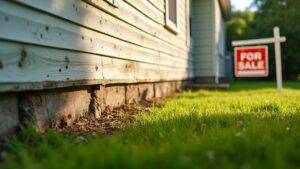Vacant homes waiting to be sold often attract unwanted attention from squatters. These individuals can move in quickly and create big problems. Property owners may face unexpected delays and extra costs.
Squatters can damage your property or make it harder to sell. Legal battles to remove them can be lengthy and expensive. Anxiety and frustration can quickly build for owners trying to sell.
To avoid squatters in a vacant home before selling, use smart security, keep the property maintained, and follow local best practices. Take simple steps to deter anyone from entering or staying on your property.
Staying proactive is key to protecting your investment. This blog will give you easy tips and steps to keep your vacant home safe before the sale.
Key Takeaways
- Secure all entry points with strong locks and reinforce doors and windows to prevent unauthorized access.
- Maintain the exterior by keeping lawns trimmed, debris cleared, and adding visible security features to deter squatters.
- Install security cameras, alarm systems, and post clear “No Trespassing” signs around the property.
- Schedule frequent property inspections, vary visit times, and ask neighbors or police to monitor for suspicious activity.
- Allow only supervised, verified showings and keep keys and lockbox codes secure, changing them regularly.
Understanding the Risks of Vacant Properties
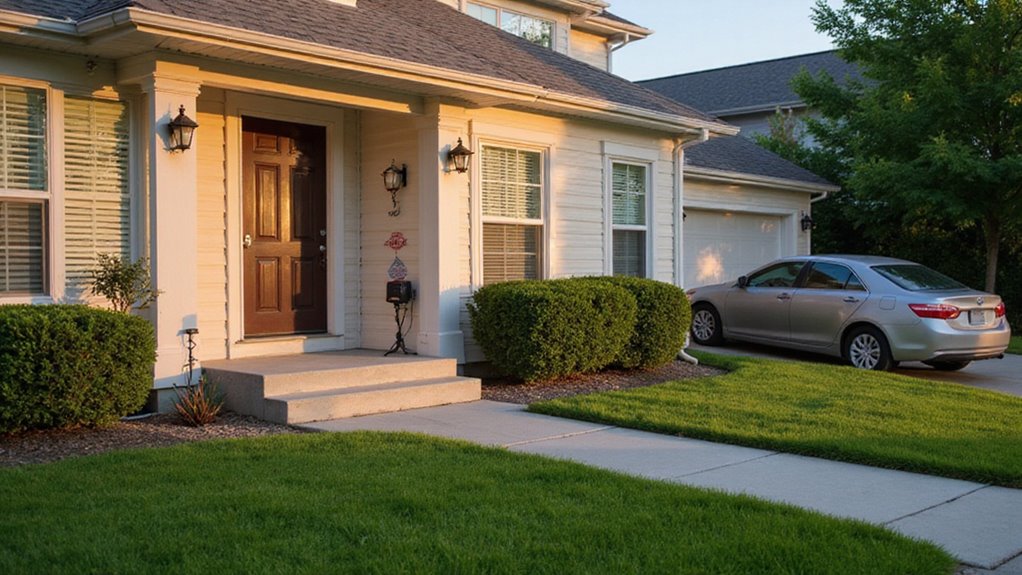
Vacant properties face many risks that can lower their value and safety. Empty homes attract squatters, vandals, and thieves. If these problems occur, owners may have trouble selling the property.
Insurance companies often limit coverage for empty homes. If a house stays vacant too long, some policies may not pay for damages. Owners could face large losses if insurance is denied. It’s especially important to understand how property liens can further complicate the sale of a vacant home if debts or disputes exist.
Visible neglect or illegal occupation can hurt the property’s value. Serious buyers may lose interest if the home looks abandoned. If buyers are deterred, offers may be much lower.
Owners should learn about these risks to protect their investment. Taking action early can prevent damage and keep the property in good shape. Staying alert helps maintain control and supports a successful sale.
Additionally, understanding disclosure requirements for vacant and potentially damaged properties is crucial to avoid legal trouble and ensure a smooth transaction.
Securing All Doors and Windows
Securing all doors and windows is the best way to protect a vacant property from squatters. Every entry point, including basement and garage doors, should be checked carefully. If you find weak locks, replace them with strong deadbolts.
Door reinforcement like strike plates and hinge shields can stop forced entry. Windows should have security film or special locks to make them harder to open. If you notice damage or tampering, repairs should be made right away. Regular inspections can also help uncover hidden problems that might otherwise go unnoticed and attract unwanted attention.
Visible security features can scare off squatters who want easy access. Regular checks help keep the property safe. If you invest in professional security, buyers will see the property as safe and well cared for. For homeowners wanting a stress-free transaction, working with a buyer who values security and offers quick closings can make the selling process even smoother.
Installing Security Systems and Cameras
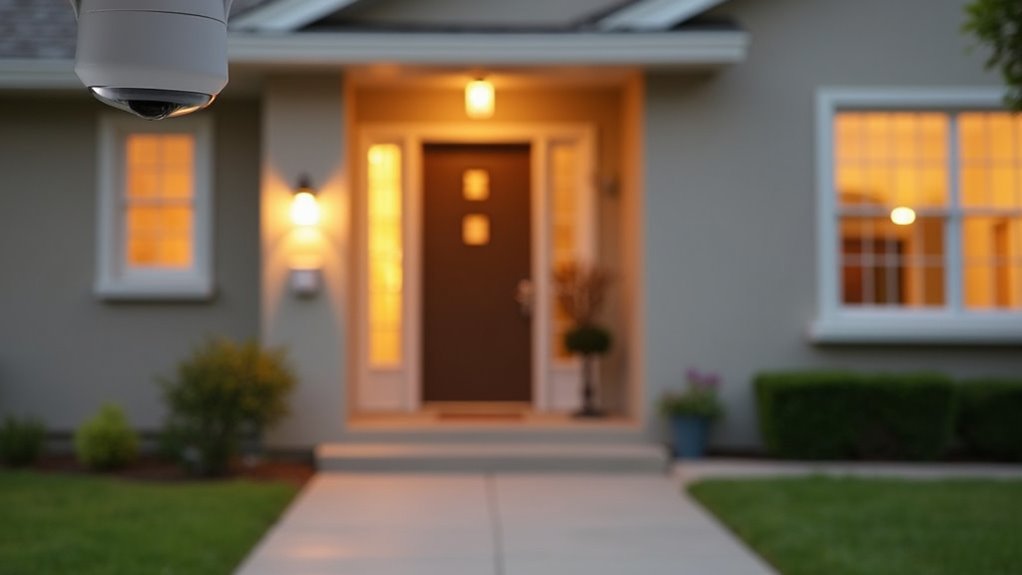
Installing security systems and cameras makes vacant properties less attractive to squatters. Good security can prevent break-ins and unauthorized entry. These systems help you keep your property safe. Security systems and cameras deter squatters and break-ins, helping to keep your vacant property safe and secure.
Choose alarm systems with remote monitoring and instant alerts to your phone. If you get an alert, you can respond quickly. Some alarm systems let you control them from anywhere. Specialized vacant property insurance can also require evidence of protective measures like alarms and cameras to remain valid.
Place security cameras at all main entrances, driveways, and back doors. Visible cameras warn others that your property is watched. Cameras with motion detection and night vision work better, especially at night.
Centralizing your alarms and cameras into one system makes monitoring easier. If the systems work together, you save time and effort. Buyers often prefer homes with strong security features.
For homeowners looking to sell quickly, fast closings can also help reduce the risk period when a property sits vacant and becomes a target for squatters.
Using Timed Lighting to Create Activity
Timed lighting helps make a property look lived in. This can help keep squatters away when no one is home. Lights that turn on and off at different times create the appearance of activity.
You can use timers to control lights in rooms like the living room, kitchen, and bedrooms. If you set the lights to change at random times, it looks more natural. Some smart lighting systems let you adjust settings from your phone. By pairing timed lighting with professional photos, you also increase your listing’s attractiveness to online buyers.
Real estate agents know that well-lit homes attract less attention from trespassers. If you use timed lighting, your property could be safer and easier to sell. This simple step can increase your home’s security while it is empty.
Adding maximized natural light not only deters squatters but also makes the interior more appealing to potential buyers.
Regular Property Inspections
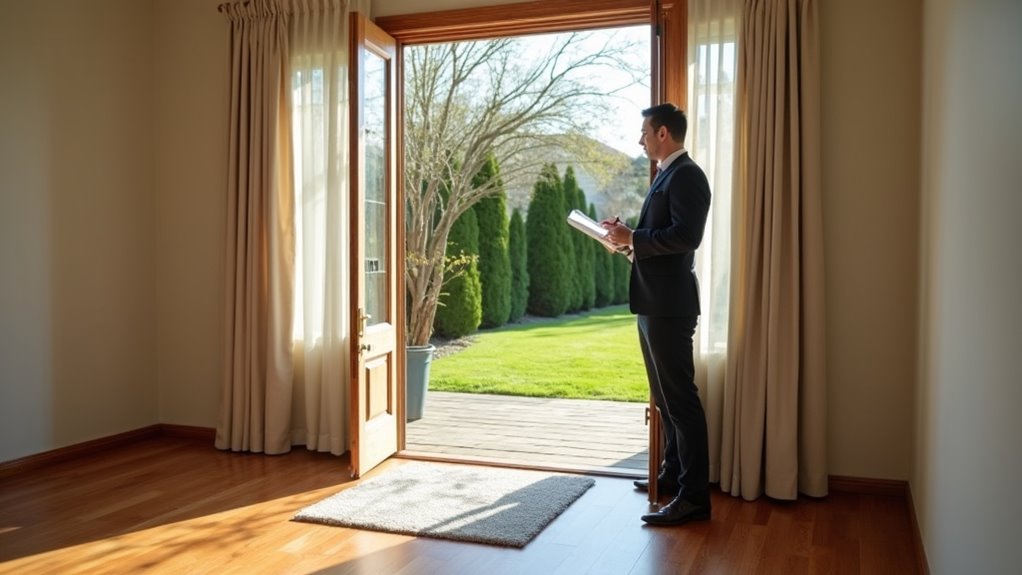
You need to schedule regular walk-throughs to spot any early signs of unauthorized entry or property neglect. In between inspections, ask a trusted neighbor to keep an eye out for suspicious activity and report anything unusual. Consistent monitoring sends a clear message that the property is actively managed and off-limits to squatters.
Additionally, documenting each inspection and visible property issues can help you provide evidence of management and compliance in case of any future disputes. Regular inspections are also an effective way to maintain property condition, which can help your home sell faster and deter unauthorized occupants.
Scheduled Walk-Throughs Matter
Scheduled walk-throughs help prevent squatters. Regular inspections show that your property is being watched and cared for. If you skip inspections, your property may look abandoned.
Schedule visits at different times to avoid patterns. Keep clear records of every inspection for your files. These steps make it harder for squatters to target your property.
During each visit, check for any break-ins or signs of unauthorized people. If you notice problems, address them quickly. Use neighborhood watch groups to help report suspicious activity.
Your ongoing presence protects your investment. Scheduled walk-throughs also help keep your property ready for the next tenant. If you stay consistent, you reduce the risk of unwanted occupants.
Local Neighbor Involvement
Involving trusted neighbors helps protect your property from squatters. Neighbors can check your home regularly when you are not nearby. Their watchful presence makes your property less attractive to intruders.
Ask a neighbor to look for broken windows or unlocked doors. You should also request they report anything suspicious right away. If possible, join the neighborhood watch for more support.
Share your contact details so neighbors can reach you quickly. Encourage them to tell you about anything unusual. If duties are shared among several people, it is harder for squatters to predict when someone will be there.
Working with the community adds extra protection for your vacant home. This keeps your property safer and ready for sale or rent.
Informing Neighbors and Local Authorities
Letting neighbors and local authorities know about your empty property helps prevent squatters. Trusted neighbors can watch the property and contact you if needed. If they see anything unusual, they should report it right away.
You should also tell the local police that your property is vacant. Police may provide extra patrols or routine checks if asked. If local rules allow, registering your property as vacant helps keep it on their watch list. In areas with high buyer demand, neighborhoods often see more attention from authorities and the community, which can further enhance your property’s security.
Open communication with neighbors and authorities improves your property’s safety. Responsible owners take these steps to reduce the risk of unwanted visitors. If you do this, your property will be more secure. You can also benefit from flexible closing timelines when selling to a local home buyer, allowing you to coordinate your sale with your security plans.
Removing Mail and Flyers Promptly
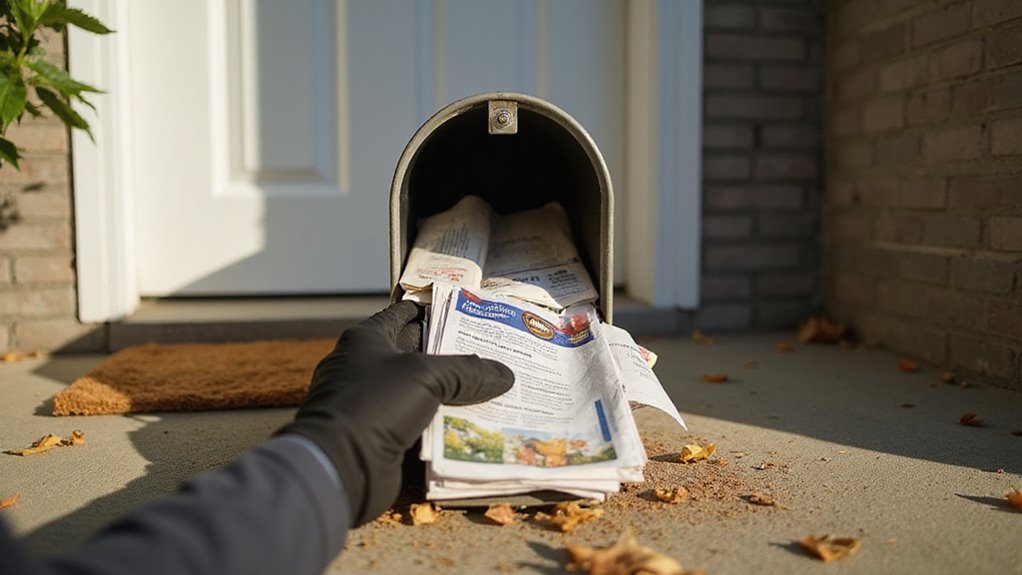
You need to remove mail and flyers from your property promptly to avoid obvious signs of vacancy that attract squatters. Consistently clearing your mailbox and doorstep keeps your home’s curb appeal intact and signals ongoing activity. In today’s market, visible neglect can quickly turn your property into a target.
Regularly attending to these details can also help you avoid property maintenance issues that can arise during the probate process. Taking this simple step also helps maintain your home’s market value by ensuring it looks cared for, which is especially important if you plan to sell quickly for cash.
Discouraging Signs of Vacancy
Discouraging signs of vacancy attract squatters to empty homes. Mail piling up or flyers at the door show a house is empty. You should remove these signs quickly to protect your property.
You can ask a neighbor to collect your mail if you are away. Stopping newspaper deliveries and redirecting packages will also help. If these steps are taken, your house looks lived in.
Checking for new flyers, cards, or notices at the door is important. Regular visits let you remove these items before they pile up. If you keep the entry clear, squatters are less likely to notice your property.
Maintaining Curb Appeal
Maintaining curb appeal means keeping the outside of your property clean and attractive. A neat exterior shows the home is cared for. If you ignore small tasks, the property can look neglected.
Accumulated mail or flyers suggest the home may be vacant. This can attract unwanted visitors or potential squatters. If you cannot check daily, ask a neighbor or property manager to help.
Fresh landscaping adds to security and attracts buyers. A cut lawn, trimmed bushes, and seasonal flowers create a welcoming look. Both the outside and inside should look well managed.
Regular upkeep keeps your property safe and appealing. If you stay on top of these tasks, your home will stand out for the right reasons.
Maintaining the Yard and Exterior
A well-kept yard and exterior help prevent squatters from targeting your property. They show the home is looked after and not abandoned. If you keep the outside tidy, it is less likely to attract unwanted attention.
Regular lawn care is important. Trim grass, shape shrubs, and remove any debris. If the yard looks cared for, the property is less likely to seem empty.
Strategic landscape design also helps. You can use low-maintenance plants and neat mulch beds. These features make a property appear managed.
Exterior lighting adds another layer of security. Motion-activated lights near doors and paths can scare off trespassers. If the outside is well-lit, people may think someone is home.
A maintained exterior can also raise the property’s value. It may attract more buyers if you decide to sell. If you want to protect your vacant home, these steps are useful.
If you’re preparing to sell, a tidy exterior also sets the stage for a competitive price by making your property more appealing to potential buyers.
Hiring a Property Manager or Caretaker
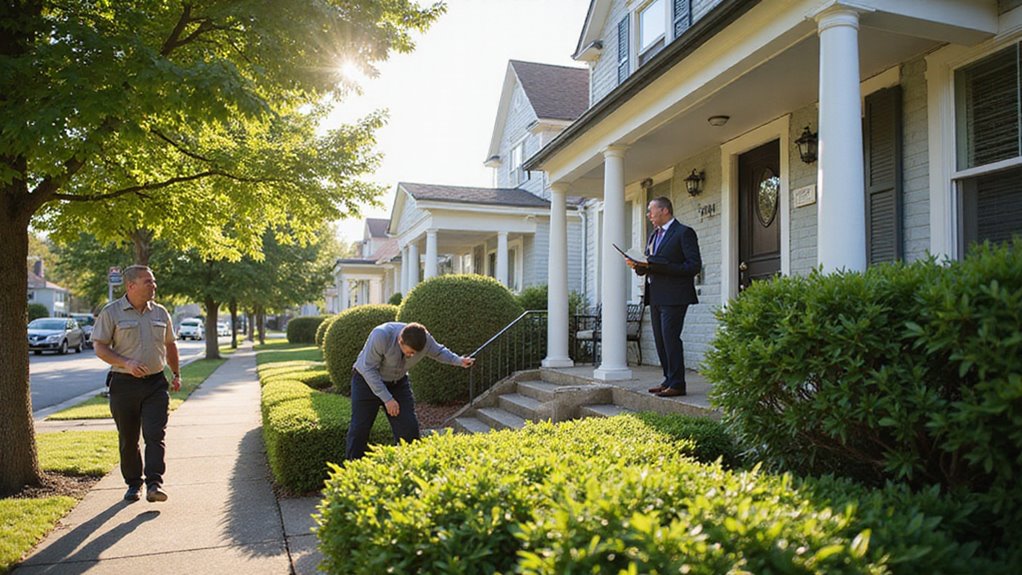
Hiring a property manager or caretaker is a good way to keep squatters away from your empty property. The manager visits the property often and handles repairs quickly. Regular checks and a visible presence help stop unwanted visitors.
If you choose to hire someone, look for candidates with experience in property care. Check for a strong history in tenant screening and property oversight. Good managers know local rules and can act fast in emergencies.
Always use a clear contract or agreement when hiring. This document should list each person’s duties and when they can access the property. Clear agreements help avoid problems and support your legal rights if there is any dispute.
Putting Up No Trespassing Signs
You need to post clear No Trespassing signs to establish legal protection and ward off possible squatters. Place signs at every entry point, property boundary, and any area vulnerable to unauthorized access for maximum effectiveness. Proper signage not only strengthens your case if legal action becomes necessary, but also sends a direct message that you actively monitor and manage your property.
Legal Protection and Deterrence
Posting clear “No Trespassing” signs is an effective way to protect your property and discourage squatters. These signs show that you do not allow entry, making your intentions clear. If you want a simple step for legal protection, start with visible signage.
A “No Trespassing” sign acts as a legal notice to everyone. If someone ignores it, prosecution for trespassing becomes easier. Insurers may also require such signs before approving claims for damage or theft.
Police respond faster when they see clear warnings on your property. If you use these signs, you reduce confusion about your rights. This step can help remove unauthorized occupants more quickly.
Sign Placement Strategies
When placing “No Trespassing” signs, position them where people will easily see them. Signs should be at all main entrances and pathways. Install signs at eye level and make sure they face the direction visitors will come from.
If you use large, reflective letters, the signs will be easy to read at any time. Check the signs often to keep them free from plants or dirt. This helps keep your warning clear and visible.
Strategic sign placement does more than discourage unwanted visitors. It also shows you have warned people, which can help you legally if there are problems. If you want to sell your property, visible signs show buyers that your home has clear boundaries and security.
Limiting Public Knowledge of the Vacancy
Vacant properties are at higher risk of attracting unwanted visitors. Limiting public knowledge about a vacancy helps reduce this risk. Property owners should keep the availability of their property private.
Owners should never share the exact address or vacancy details online. Marketing materials, if needed, must not show that the property is empty. If someone must advertise, they should use general descriptions.
Neighbors and friends should not discuss the vacancy with others. If you need to inform someone, only share information with trusted people. Always remind others to keep details private.
Screening Buyers and Showing Appointments
You need to verify every buyer’s identity before confirming a showing, using government-issued ID and cross-checking contact information. Always supervise property access yourself or assign a trusted agent to prevent unauthorized entry. This vigilant approach not only deters squatters but also reassures legitimate buyers of your professionalism.
Verifying Buyer Identities
Verifying buyer identities is important to reduce risk and prevent property squatters. You should not trust only first impressions or spoken promises. Careful checks help protect your property.
Always ask buyers for a government-issued photo ID before in-person showings. If they refuse, consider postponing the meeting.
Check phone numbers, email addresses, and employment details against public records or online profiles. Any mismatch could be a warning sign.
If a buyer will enter your property alone or wants to make an offer, consider running a basic background check. This can reveal issues you may need to know about.
Proper verification can help keep your property and your peace of mind safe.
Supervised Property Access
Supervised property access helps prevent squatters from entering your home. You should always be present or have a trusted agent during showings. Never allow anyone to visit the property alone.
Keep all keys secure and use lockboxes with codes that change often. Only give access to people who have confirmed appointments. Always check visitor details before letting anyone in.
If you join a neighborhood watch, they can help monitor the area. Inform them about scheduled showings so they know who should be there. They can report any unusual activity to you.
Have each visitor sign in and show identification at every showing. Keep a record of everyone who enters your property. If you limit open house hours and track all visitors, you reduce the risk of squatters.
Working With Real Estate Professionals
Real estate professionals help keep your vacant property safe from squatters. They know local rules and keep your property in good condition. Their actions can make your home less appealing to unauthorized occupants.
These experts check your property often and follow all local laws. If you need regular updates, a real estate agent or property manager can provide them. They spot any problems early and fix them before they get worse.
Professionals also market your property to fill vacancies quickly. If your home is listed and shown often, squatters are less likely to target it. Choosing someone with local knowledge is important for the best results.
Responding Quickly to Signs of Intrusion
Squatters often target empty properties. If you notice signs like broken locks or strange vehicles, act fast. Quick action can prevent bigger problems.
Empty properties are prime targets for squatters—watch for broken locks or unfamiliar vehicles and respond quickly to avoid serious issues.
You should take photos and write notes about any damage or suspicious activity. If you see anything unusual, contact local police right away. Reporting early helps authorities respond quickly.
Consider improving your security with motion-sensor lights or smart cameras. Security devices can scare off intruders and record useful evidence. If you cannot visit often, hire someone to check the property regularly.
Fast responses help protect your property and keep you in control. Regular checks and good security reduce the chance of squatters moving in.
Conclusion
If you want to avoid squatters, you must take steps to secure your vacant home. If homeowners use security measures and regular check-ins, they can protect the property and keep the sale process on track. Taking action early can prevent many common problems with vacant homes.
If you choose to sell quickly and avoid risks, selling for cash can be a good option. We buy houses for cash, which means you do not have to worry about squatters or long waits. If sellers need a fast and simple solution, this can save time and stress.
If you are ready to sell or want to learn more, contact us at Align Real Estate Solutions. We can help you protect your property and get a fair cash offer. Let us make the selling process safe and easy for you.
Author
-

Zach Koops is co-founder and Real Estate Success Manager at Align Real Estate Solutions, serving homeowners across Virginia since 2024. With a passion for real estate and a heart for people, Zach has built his career around helping sellers navigate tough situations—foreclosure, inheritance, relocation, repair-overload—with clarity and compassion. He’s known for being straightforward, steady under pressure, and deeply invested in relationships. Outside of work, he spends his time as a husband and father, enjoys the outdoors in Shenandoah Valley, loves singing on stage, and constantly seeks growth through reading and new experiences.







